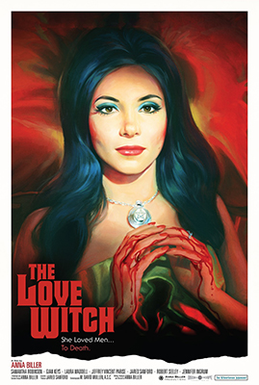Perhaps some content creators use genre as a guide when writing, or when filming a movie. Some categories are pretty well defined—the western, the romance, or in writing specifically, the literary. Others are less easily settled. Horror is particularly slippery. Although The Love Witch was an interesting story with a feminist message, the horror trappings weren’t entirely obvious. In fact, it reminded me quite a bit of The Wicker Man. (Not in any literal way, of course.) Afterward I read that it is also a comedy and that helped make sense of it. It gets generally high marks although, to me, the acting seemed pretty wooden. The Love Witch follows Elaine, a young, present-day witch, who’s moving to a small town in California that tolerates witches. Her husband has recently died and flashbacks imply that Elaine may not have been entirely innocent in the matter.

Once she settles in Arcata, she starts looking for her “prince charming” as she continues to practice the craft. She finds an emotionally unstable professor who take her home readily enough, but he quickly proves to be too needy. Part of this is because he took a love potion she gave him. He dies that very weekend. Elaine seems less than distraught as she buries him and begins seeking the next possibility. The husband of a friend comes over when the friend is out of town and he too proves emotionally immature. After their affair he dies by suicide. A policeman investigating the missing professor comes to suspect Elaine, but he too feels drawn to her. The locals, meanwhile, aren’t as witch-friendly as they seem. They riot in a burlesque club, chanting, “Burn the witch, burn the witch!” I won’t spoil the ending.
I was watching all of this with the genre “horror” in my mind. I’d not seen it labeled as “comedy,” and, as an art film there’s nothing so crude as a laughter track or cheesy and obvious comic music. Instead, the film is an example of “the female gaze.” Film analysts, and even religion scholars, have long written about “the male gaze,” which looks at women a certain way. This movie’s writer, director, and producer, Anna Biller, experiments with the female gaze instead. The results for some men, I suspect, are disturbing. They certainly aren’t in control in this film. Retro in execution, it’s unlike most other horror I’ve watched. Unusual for the genre, the critics responded well to it. It was a fun flick, but I’m still not sure how wide “horror” stretches, but I do sense that it’s quite inclusive. And I applaud the female empowerment on display, even if I’m confused.
